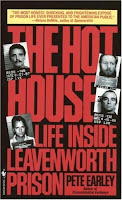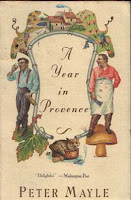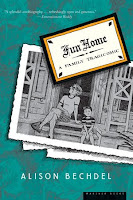Sunday Salon 18 - Non-Fiction Reading
 Feels like a long time since I've done a Sunday Salon. In reality it hasn't, but I guess time is just moving so quickly! I've been tossing around ideas for SS lately, and since the Non-Fiction Five Challenge just ended earlier this week, I thought I'd focus on non-fiction.
Feels like a long time since I've done a Sunday Salon. In reality it hasn't, but I guess time is just moving so quickly! I've been tossing around ideas for SS lately, and since the Non-Fiction Five Challenge just ended earlier this week, I thought I'd focus on non-fiction.
It's always a little funny to me when people say that they don't like non-fiction. Seems so long ago when I first signed up for Joy's NFF Challenge and was scared out of my wits. I told my husband, "well, I just committed to reading *five* non-fiction books. Ugh!" That was two years ago. This year 25% of my reads have been comprised of non-fiction titles. When I think of non-fiction I still sometimes think of the dry and arduous reads of my grad school days, but there is so much more out there! So many fascinating stories and histories to learn about. These are my non-fiction reads of 2009 (so far): Walking Through Walls by Philips Smith is the author's memoir of growing up with a father who became involved with mystic healing and psychic experiences during the 1960s in Miami. A fascinating and absorbing coming of age story that will have even the non-believers sitting on the edge of his seat.
Walking Through Walls by Philips Smith is the author's memoir of growing up with a father who became involved with mystic healing and psychic experiences during the 1960s in Miami. A fascinating and absorbing coming of age story that will have even the non-believers sitting on the edge of his seat. The Hot House by Pete Earley is about Leavenworth Federal Penitentary in Kansas. Following the lives of six inmates, Earley provides details about what life is like inside the prison. Definitely not something I would have picked up on my own, but a coworker assured me that I would quickly be engrossed in the intimate details of these six prisoners' lives.
The Hot House by Pete Earley is about Leavenworth Federal Penitentary in Kansas. Following the lives of six inmates, Earley provides details about what life is like inside the prison. Definitely not something I would have picked up on my own, but a coworker assured me that I would quickly be engrossed in the intimate details of these six prisoners' lives. A Year in Provence by Peter Mayle is a travel memoir about the author's buying and renovating a home in Provencial France. For travel and food junkies, this is a great pick, although I'll admit that I felt the author was too removed from the story. Even though it wasn't one of my favorites, it was an interesting read and my book club members all really enjoyed it.
A Year in Provence by Peter Mayle is a travel memoir about the author's buying and renovating a home in Provencial France. For travel and food junkies, this is a great pick, although I'll admit that I felt the author was too removed from the story. Even though it wasn't one of my favorites, it was an interesting read and my book club members all really enjoyed it. The Glass Castle by Jeannette Walls is one of my favorite books of the year. Walls' memoir about growing up poor with more or less absent parents was an incredible read. You'll want to cry for Jeannette and laugh with her and ultimately cheer her on through all of her struggles. The writing is also fantastic--not a dry spell in the entire book. Definitely one to pick up if timid about non-fiction!
The Glass Castle by Jeannette Walls is one of my favorite books of the year. Walls' memoir about growing up poor with more or less absent parents was an incredible read. You'll want to cry for Jeannette and laugh with her and ultimately cheer her on through all of her struggles. The writing is also fantastic--not a dry spell in the entire book. Definitely one to pick up if timid about non-fiction! Catch Me if You Can by Frank W. Abagnale was such a fun read! I'm sure most of you have seen the movie and are familiar with the premise, but if not Abagnale's story is about how he became a con man which made him a millionaire by the time he was in his early twenties. I couldn't believe the cons Frank pulled off, and this one had me quickly turning the pages to see what he'd get into next.
Catch Me if You Can by Frank W. Abagnale was such a fun read! I'm sure most of you have seen the movie and are familiar with the premise, but if not Abagnale's story is about how he became a con man which made him a millionaire by the time he was in his early twenties. I couldn't believe the cons Frank pulled off, and this one had me quickly turning the pages to see what he'd get into next. Fun Home by Alison Bechdel is another favorite of the year (still haven't reviewed it, though). Bechdel shares her story of growing up in a home with a father who was incredibly particular and difficult to please. As she enters adulthood, she also comes to terms with her own sexuality as well as finding out that her father is gay. Both a sad and moving story of father/daughter relationships.
Fun Home by Alison Bechdel is another favorite of the year (still haven't reviewed it, though). Bechdel shares her story of growing up in a home with a father who was incredibly particular and difficult to please. As she enters adulthood, she also comes to terms with her own sexuality as well as finding out that her father is gay. Both a sad and moving story of father/daughter relationships. The Lost City of Z by David Grann is riveting book about Percy Fawcett, an early twentieth century British explorer, and his obsession with finding the city of Z in the Amazon. Fawcett went missing during his last exploration and Grann makes some interesting posits about what might have gone wrong. Also fascinating tidbits about the Amazon--the world's largest jungle.
The Lost City of Z by David Grann is riveting book about Percy Fawcett, an early twentieth century British explorer, and his obsession with finding the city of Z in the Amazon. Fawcett went missing during his last exploration and Grann makes some interesting posits about what might have gone wrong. Also fascinating tidbits about the Amazon--the world's largest jungle. The Complete Maus by Art Speigelman. Are you tired of hearing me talk about this one? Another favorite of the year and all time, Maus is in part a biography of Art's father and his survival of Auschwitz during WWII and in part a memoir of Art's struggles to write his father's story. Can't recommend this one enough--mom just read my copy and loved it, too.
The Complete Maus by Art Speigelman. Are you tired of hearing me talk about this one? Another favorite of the year and all time, Maus is in part a biography of Art's father and his survival of Auschwitz during WWII and in part a memoir of Art's struggles to write his father's story. Can't recommend this one enough--mom just read my copy and loved it, too. Midnight in the Garden of Good and Evil by John Berendt is a travel expose with a murder twist. I liked this one so much that I've read it twice! The characters in Midnight are unparalleled and with a setting of Savannah, Georgia, there is so much to be entranced by in this book. The courtroom details can get a little wearing, but with twists and turns you won't believe this is non-fiction.
Midnight in the Garden of Good and Evil by John Berendt is a travel expose with a murder twist. I liked this one so much that I've read it twice! The characters in Midnight are unparalleled and with a setting of Savannah, Georgia, there is so much to be entranced by in this book. The courtroom details can get a little wearing, but with twists and turns you won't believe this is non-fiction. The Impostor's Daughter by Laurie Sandell (no review yet) is another graphic memoir about father/daughter relationships. Sandell idolized her father growing up and for good reason--he was everything and more. But as she starts to piece together her father's shady past, she realizes he might not be the man she thought he was. Not my favorite of the year but others have really enjoyed it.
The Impostor's Daughter by Laurie Sandell (no review yet) is another graphic memoir about father/daughter relationships. Sandell idolized her father growing up and for good reason--he was everything and more. But as she starts to piece together her father's shady past, she realizes he might not be the man she thought he was. Not my favorite of the year but others have really enjoyed it. Under the Tuscan Sun by Frances Mayes is in many ways similar to the above A Year in Provence. Mayes' travel memoir about buying and restoring a house in Tuscany, Italy also delves into the finer things in life--history, culture, food, and life. Where AYP was lacking personality, Mayes makes up tenfold. A sumptuous read for those looking to slowly enjoy the simpler things in life.
Under the Tuscan Sun by Frances Mayes is in many ways similar to the above A Year in Provence. Mayes' travel memoir about buying and restoring a house in Tuscany, Italy also delves into the finer things in life--history, culture, food, and life. Where AYP was lacking personality, Mayes makes up tenfold. A sumptuous read for those looking to slowly enjoy the simpler things in life.
So there you have it. I've come to realize that I prefer the sub-genre of memoir, but even memoirs aside I've discovered some fascinating non-fiction books this year.
Sunday's Questions:
Do you like to read non-fiction books or does it make you want to crawl in a hole and hide? Have you tried some that you absolutely loved or didn't like at all? Do you think that non-fiction sometimes gets a bad wrap as being dry and boring (and yes, some of it is!!)? If you had to recommend a non-fiction book to someone who was timid of the genre, what would you recommend?
Hope everyone is having a great Sunday!
On the Homefront:
I start the second session of cake decorating course tomorrow, so it should be interesting/yummy. I didn't get pictures of Europe finished like I planned, but I hope to have those up soon as well. If only blogger didn't take so dang long to upload! And a surprise--hubby, who had planned to travel Europe for a few more weeks, came home yesterday. I guess travelling without me just isn't as fun. :P
Also, on a crazy whim I started a 100 Mile Fitness Challenge. I'm so excited to have about 15 others doing the challenge with me (yes, even my mom!!). I'd love if you joined us!


 Title: Catch Me If You Can
Title: Catch Me If You Can



